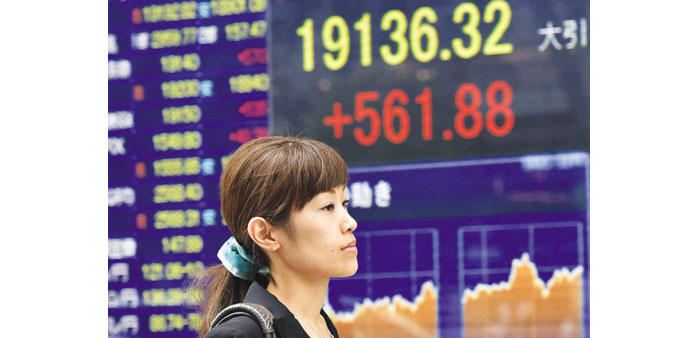A woman passes before a share prices board in Tokyo. Japanese stocks rose 561.88 points to 19,136.32 points yesterday.
AFP/Tokyo
Asia stocks rose yesterday on strong US economic growth figures, but European markets stumbled at the end of a torrid week that has been plagued by worries over China’s slowdown.
Global equities were hammered on Black Monday as risk-averse investors dumped shares on spreading panic that the flagging Chinese economy could spark a new world recession.
However, sentiment was soothed by Tuesday’s interest rate cut from the People’s Bank of China (PBoC) and by Thursday’s bright gross domestic product (GDP) data in the US.
“After a hectic rollercoaster of a week across financial markets, many will be glad to see the back of it,” said London Capital Group analyst Brenda Kelly.
“The moves by the PBoC and the better-than-expected US GDP has revived risk taking to a degree.”
Tokyo led the gains yesterday, with Shanghai and several other markets in tow, and oil prices zoomed higher after the US reported a surprisingly strong new estimate of economic growth for the second quarter.
The latest data, which showed the world’s biggest economy grew at an annual rate of 3.7% in the April-June quarter, buoyed markets that have been worried over the faltering Chinese economy, which accounts for some 13% of global output.
“We end the week on another positive note, and the craziness we’ve seen over the last couple of weeks seems to be dissipating,” said Chris Weston, chief markets strategist at IG Markets.
Markets across the world saw recoveries, with the S&P 500 surging to its second straight gain on Wall Street on Thursday.
In Asia yesterday, Tokyo jumped 3.03% higher and Shanghai gained 4.82%. Seoul, Sydney, and several other Asian markets also rose.
Hong Kong, however, dropped 1.04% despite making early gains.
In Europe, Frankfurt and Paris stocks fell by 0.69% and 0.51% respectively, with London shedding 0.23%. All began the day with modest rises.
The advances across key Asian bourses first began on Wednesday, when markets—with the exception of Shanghai—began to find their footing.
The Chinese market made substantial gains the following day, however, indicating prices have, for the moment, found their floor, dealers said.
The latest advances come as a relief to investors who at one point saw $8tn wiped off global markets in a two-week stock market rout.
Beijing has sought to mitigate those concerns in recent days by taking a series of measures, from boosting the amount its massive state pension fund can invest in stocks, to cutting interest rates and slashing the amount of money banks need to hold in reserve.
The measures are not only aimed at increasing cash flow in China, but also at reviving confidence that Beijing can steer the economy away from a hard landing and keep global growth on course.
Markets took their lead, however, from the US growth report, which, though it covered only through June, confirmed the economy has not yet been undermined much by China’s downturn.
It added to other strong recent data on consumer confidence and durable goods orders.
“The US economy continues to perform on a consistent basis... (showing) that its economic recovery is sustainable,” said FXTM chief market analyst Jameel Ahmad.
Concerns in the recent stock market panic focused on China’s role in past years as the main driver of global growth, with Europe in the doldrums and the US struggling to maintain a recovery.
But Chris Green, an Auckland-based strategist at First NZ Capital, said the figures showed the US economy was in better shape.
“It gave credence to the story that the US economy could be building momentum,” he said.
“We seem to have gained some sort of stability and people are focusing more on the underlying strength of the US economy.” The latest data boosted the dollar as well as oil prices on Thursday, but caution crept in yesterday. In London foreign exchange deals yesterday, the dollar edged up to ¥136.32 and $1.1286.
Eyes were turning toward a central banking symposium that the US Federal Reserve was hosting in Jackson Hole, Wyoming, which lasts until today.
Investors hope for indication whether the US central bank believes the global turmoil is severe enough to delay a long-expected hike in interest rates.
On Wednesday, New York Federal Reserve head William Dudley said that the Chinese turmoil had made the arguments for a rate rise in September “less compelling.”
Gains from upbeat releases in the US were tempered, however, by data in Japan that showed that inflation in the Asian powerhouse fell back to zero in July while household spending dropped for a second straight month.

